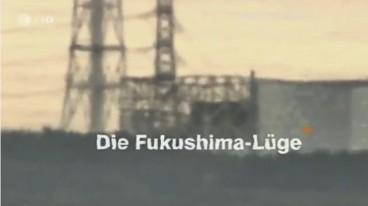Gespeichert von literature am

The Fukushima Lie
Whenever we think about “media”, or words such as “government” and “Conglomerate” occur to us together. And whenever we think about an accident, media always play an important role. In Japan in 2011, there was a serious explosion of nuclear facility resulted from a tsunami. The tsunami heated an entire area of the Hukushima region and it made it a ground zero.
The documentary The Fukushima Lie, directed in 2013 by ZDF (German Broadcast) shows us a deep relationship between Japanese media, Japanese government, and the Tokyo Electric Power Company, Inc. (TEPCO) relating to the accident. At first, the reason of the explosion was definitely the fault of TEPCO. They hadn’t predicted and prepared for any possibility of natural disaster. In addition, they already knew that there was something missing in their facility related to the safety system. So, the first reason that the disaster has been treated like it has is the responsibility of the company.
However, government officials did play a quite a big role in the matter, ignoring the problems with the safety system. According to the testimony in documentary, one man who had worked at TEPCO for nuclear facility in Fukushima, said that even the government knew the fact and everyone had concealed it. If it was hard to be honest to the public because they are the first-step suspect, who should reveal the truth and let people know it?
Media should do it. In this point, it’s vague to set some range for media to do something for public interest. How big is their role in society? How can they access the truth for public interests? I believe that the role of media in society has the possibility of only being closer to the truth in succession with every efforts they can, not finding the truth. Originally, it’s not possible to find real truth. It could be not existing thing.
How did Japanese Media react? It may be obvious to some that they sided with the government. The documentary The Fukushima Lie follows the life of one man who left TEPCO after the accident. He had also been pressed to be in connivance with them. According to his account, cabinet members of Japan have received big sums of money in the name of political support from TEPCO and government officials also reemployed to TEPCO after their retirement. The researchers who would acquiesce their fault also have received the money in the name of research grants. In this circumstance, what has Japanese media done? They received free advertising from TEPCO as implicit consent with ‘nuclear mafia’ (the people who blew the whistle call this 3 groups nuclear mafia.) In this way, one cartel has been made in society of japan and nobody can touch it.
Government, conglomerate, and media has a strange relationship of coexistence and win-win. For media, it’s hard to be completely separated from this relationship, as we already know. But the important thing is that they do the minimum amount of contact as their position allows if they want to be called as “eyes and ears of public.” In this point, what is the minimum amount of a person in the media’s duty? Perhaps being more conscious and more being ethical. German media did the things that Japanese media couldn’t or didn’t themselves. It’s such unnatural condition. By this documentary, we can think about media which is deeply related within politics and economy as an “ethical” institution in our society. It has irony and we need more discussion about it. In this sense, The Fukushima Lie is provides good content for thinking about ethical role of media and its relation with politics.
-ARA CHO


